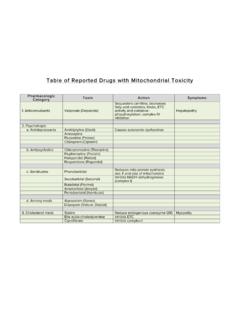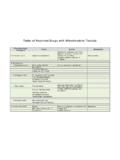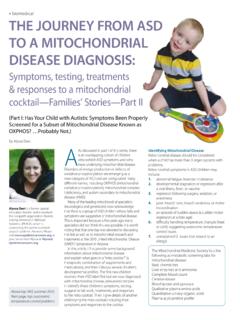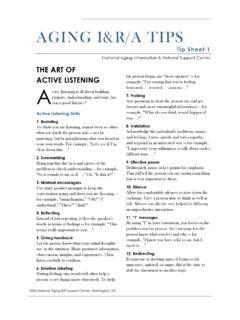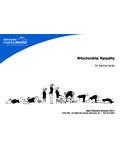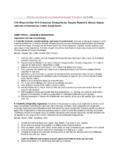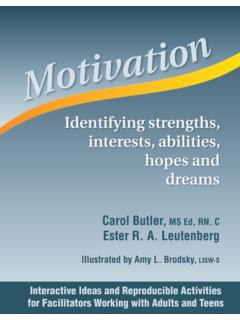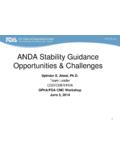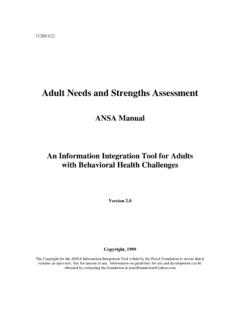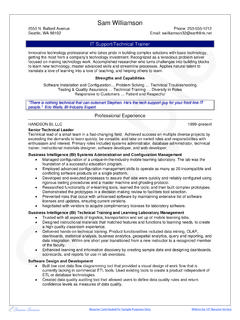Transcription of T 888.648.6228 E info@mitoaction.org PO Box …
1 T E PO Box 51474 Boston MA 02205 check list for Strengths and needs when planning for educational goals!This is a great way to talk about your child s strengths and weaknesses when you have planning meetings for their educational goals! check list for strengths and weaknesses for _____: Date:_____Age:_____Grade____ Please answer yes/no to left of statement, as it relates to the child in question. Comprehension: __ Interested in listening to stories, audio tapes, songs and a variety of listening activities __ Takes good notes __ Experiences difficulty distinguishing between similar sounds __ Experiences difficulty following directions, especially when it's more than one at a time __ Doesn't enjoy participating in class discussions and rarely raises his/her hand to respond __ Unable to follow oral discussion and take notes Oral Language: __ Strong articulation skills __ Uses voice intonation and good expression __ Expanding vocabulary __ Difficulty with oral language uses lots of interjections and hesitations (umm, uh, ), weak verbal expression __ Grammar skills are quite weak __ Forgets a lot of words and can't often remember what he/she was going to say Reading.
2 Ability to re-tell what was just read and predicts what may happen based on what has happened __ Confuses words and letters __ Often loses place when reading, requires finger tracking __ Difficulty when silent reading, needs to mouth words or whisper when reading __ Doesn't enjoy reading __ Reluctant Reader __ Reading is slow and deliberate __ Lots of word substitutions, omissions and invented words __ Cannot skim or scan for pertinent information Written Work: __ Written ideas follow a logical sequence __ Ideas are clearly written and expressed __ Rarely enjoys writing and responds negatively to written activities __ Written work is rarely legible __ Experiences difficulty when copying instructions from the board, orally or chart paper __ Rarely completes written assignments __ Written work is poorly organized and difficult to follow __ Punctuation and grammar is weak and often missing __ Written ideas lack cohesion __ Written work is often difficult to understand __ Spelling is weak __ Letters and/or words are often reversed Copyright 2009 Kirsten Casale and.
3 __ Rarely sequences numbers, equations and formulas appropriately __ Unable to perform 'mental math' __ Computations are usually inaccurate __ Many careless errors, often chooses the wrong operation __ Difficulty understanding mathematical concepts __ Rarely uses mathematical terms appropriately both orally and in written work __ Does not remember the math facts (although today, many children aren't committing the math facts to memory) __ Cannot do mathematical word problems Motor Skills: __ Is often clumsy and accident prone __ Has weak coordination __ Awkward gait __ Weak fine motor skills (evidenced in art, written work, copy etc.) __ Holds pencils, pens, crayons, scissors inappropriately - too hard or not hard enough __ Exhibits weak large motor coordination during gym and recess (falls or trips frequently Social Skills: __ Has a difficult time establishing friends or has friends that are younger __ Rarely accepted by peers __ Argues with peers __ Doesn't accept responsibility well __ Avoids peer contact and is often ridiculed or involved in ridiculing __ Demands instant gratification, seeks a great deal of attention __ Doesn't like to follow routines and rules __ Prone to tantrums Behavior Skills.)
4 __ Average activity, not over or under active __ Usually on time __ Often is hyperactive __ Rarely completes tasks in the allotted time __ Often acts out in the classroom and doesn't follow routines and rules __ Can be extremely moody and acts impulsively __ Very disorganized __ Inattentive and distractible __ Does not get along well with peers __ Decision making skills are weak and is often late or absent __ Easily frustrated Please answer these questions as they pertain to _____ Impairments in Social Interaction: check if applicable. ____wanting and needing to be left alone at times ____trouble with back and forth social interactions ____inability to respond to social cues ____inability to understand how someone else might feel ____inappropriate giggling or laughing ____impaired imitation - not engaging in simple games of childhood ____not accepting cuddling, hugging, touching unless self initiated ____lack of socially directed smiles when young ____little sense of other people's boundaries ____engaging in stereotypic question asking as interaction pattern ____inappropriately intrusive in social situations ____mimicking actions from TV, but not in reciprocal manner ____inappropriate use of eye contact, avoidance or extended staring ____poor use of non-verbal gestures ____trouble with competition, , winning, losing.
5 Being first Please answer these questions as they pertain to _____ s and his/her Restricted Repetitive & Stereotyped Patterns of Behavior, Interests & Activities: check if applicable ____repeatedly watching videos or video segments ____lining up and/or ordering objects ____strong attachment to inanimate objects (strings, Copyright 2009 Kirsten Casale and ) ____fascination with movement (spinning wheels, fans, door & drawers) ____pacing or running back and forth, round and round ____exploring environment through licking, smelling, touching ____very sensitive to sounds (may have acted as if deaf as baby) ____insistence on routines, resisting change ____negative reaction to change in environment ____perfectionist, problems with correction or "mistake" ____difficulty with unstructured time ____difficulty waiting ____impaired response to temperature or pain ____staring at patterns, lights, or shiny surfaces ____lack of fear of real danger ____excessive fearfulness of some harmless objects or situations ____defensive to touch that isn't self initiated ____history of eating problems ____history of sleeping problems Qualitative Impairments in Communication: check if applicable.
6 ____problems with pronouns ____problems getting the order of words in sentences correct ____problems answering questions ____problems responding to directions ____problems understanding jokes ____problems understanding multiple meaning of words ____problems understanding sarcasm, idioms, and figurative speech ____echoing what is said directly, later, or in a slightly changed way ____low spontaneously initiated communication ____difficulty understanding abstract concepts ____difficulty with concepts that are time bound or lack concreteness ____difficulty with long sentences ____difficulty when verbalizations are too fast ____problems with reciprocal conversations ____problems using speed, tone, volume appropriately Learning Characteristics: check if applicable. ____uneven profile of skills ____well developed long term memory ____ability to manipulate items better than paper-pencil abilities ____over and under generalization of learning ____good visual skills ____hyperactivity ____short attention span to some activities and not to others ____impulsivity ____delayed response time ____problems organizing ____sequential learner ____needs help to problem solve Observable Problem Behaviors: check if applicable.
7 ____aggression - biting, hitting, kicking, pinching ____self-injurious behaviors - biting, hitting, pinching, banging parts of body ____temper tantrums ____screaming, yelling ____non-compliance and refusal to move, to do things ____eating problems ____sleeping problems ____toileting problems ____low motivation Possible Motor Problems: check if applicable. ____clumsiness ____balance ____stiffness ____motor planning - can't seem to make body do what it needs to do ____motor fatigue - tired easily ____strength ____perceptual motor, spacing, sequencing, printing, writing ____initiation - can't seem to be started in motor acts Some Environmental Challenges that can Lower _____ s Ability to Function Competently Does _____ complain of any of the following: check all that are applicable. ____not being understood ____not understanding ____not having enough information ____not having adequate skills for job ____not having choices ____making a mistake ____being tired ____being sick ____being touched ____being hungry Do any of these Major Changes bother _____ when they occur?
8 check all that are applicable. ____alterations at school, work, home, community ____small schedule changes ____time changes ____activity location changes ____staff or teacher absent ____friend or buddy absent ____family member or friend is late or not coming ____anticipating an event or activity ____cancellation of an event or activity ____having to wait too long Do any of these Environmental situations cause Confusion for _____? ____crowds ____noise ____surrounded by too much movement ____surrounded by competing visual stimuli ____not having enough space ____being off the pace of others ____losing things of value Does _____ respond to Relationships by: check all that are applicable. ____being corrected ____being denied ____being interrupted ____being late ____being ignored ____fear of losing people who are valuable ____being teased ____being left out ____being scolded Possible Sensory Challenges: for _____ Does _____ have any Sound/Auditory issues: check all that are applicable.
9 ____has been diagnosed with hearing problem at some time ____reacts to unexpected sounds ____fears some noises ____distracted by certain sounds ____confused about direction of sounds ____making self-induced noises ____likes sounds that are constant and mask outside sounds ____Other_____ Does _____have any Copyright 2009 Kirsten Casale and issues: check all that are applicable. ____has been diagnosed with a visual problem ____is sensitive to light ____avoids eye contact ____is distracted by some or too much visual stimuli ____enjoys watching moving things/bright objects ____has difficulty tracking ____becomes excited when confronted with a variety of visual stimuli ____has trouble with stairs, heights ____enjoys patterns ____upset by things looking different ____makes decisions about food, clothing, objects by sight ____arranges environment in certain ways and can tell if out of order ____closely examines objects or hands ____likes TV, VCR ____Other_____ Is _____ showing any signs of Smell/Olfactory issues: check all that are applicable.
10 ____sensitive to smells ____smells objects, food, people ____explores environment by smelling ____reacts strongly to some smells ____ignores strong odors ____Other_____ Does _____ show any issues as they pertain to Touch/Tactile: check all that are applicable. ____is defensive about being touched ____prefers deep touching rather than soft ____has to know someone is going to touch ahead of time ____initiates hugs, cuddling ____explores environment by touching ____becomes irritated if bumped or touched by peers ____dislikes the feel of certain clothing ____refuses to touch certain things ____is sensitive to certain clothing ____over or under dresses for temperature ____doesn't like showers ____likes to play in water ____mouths objects or clothing ____refuses to walk on certain surfaces ____appears to have depth perception problems ____dislikes having hair, face, or mouth touched ____upset by sticky, gooey hands ____Other_____ Does _____have any issues that pertain to Taste: check all that are applicable.

